Rafah, Gaza Strip 26 June 2003
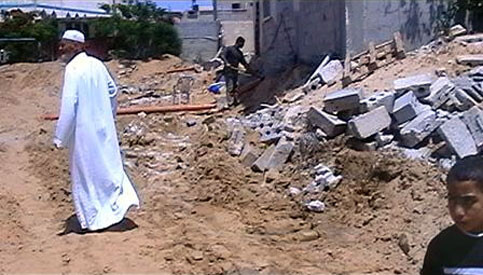
Above: Abu Ahmed walks through what used to be Muhammed Abu Salah’s garden, once full of mango, lemon, guava trees, and flowers. (ISM Rafah)
As days were slipping into summer days on June 25th, Israel invaded the Hay Salaam area on the border of Rafah — with 20 tanks, 4 bulldozers, and 2 Apache combat helicopters — demolishing four houses, 3 farms, and a garden. The damage in the Hay Salaam area is as follows:
At 11:30 PM, Israeli forces cut the electricity in all of Rafah. By midnight, the sound of Apaches filled the city center. The operation continued until 4:30 AM. Needless to say no one along the invaded areas got any sleep.
We visited Abu Ahmed this morning, a good friend of ours and everybody’s grandfather. Last night’s invasion cleared the entire area between his home and Dr. Sameer’s home one-hundred meters down the border. He was less animated than usual as he ushered us inside.
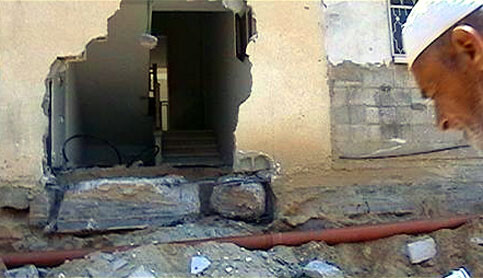
Above: Bulldozing on the outer wall of Husein Qeshta’s house from the incursion. (ISM Rafah)
“Ten tanks here, ten here,” he motionned to me from his window. “I shine my light at them, on-off-on-off-on-off, like this,” he holds his flashlight up. Its light is pale in the morning. It’s a last resort tactic, we both know. If they came to demolish Abu Ahmed’s home there’s little his weak flashlight could do. Only the hope they might notice (or care) that there were people inside and wait for them to leave before beginning demolition.
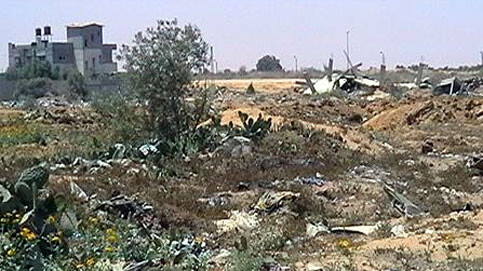
Above: The landscape from outside Abu Ahmed’s home. Dr. Sameer’s house and Husein Abd il-Aal’s demolished house, and the new no-man’s land where there was — until this morning — an olive grove. (ISM Rafah)
Abu Ahmed walks to the store on his bad leg and cane just to bring us cola, even when we know he’d rather drink tea. We sit together in the stale morning-after air.
The two demolished houses had been abandoned before the invasion — one family left two months back and one only a week ago, when the constant gunfire finally became too much to handle. Many families in threatened homes continue to live there as long as they can handle it, because once they leave their homes are marked more imminently than ever for demolition.
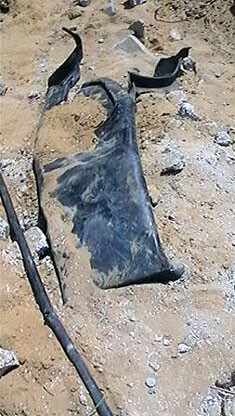
Above: Husein Qeshta’s water tank, demolished. (ISM Rafah)
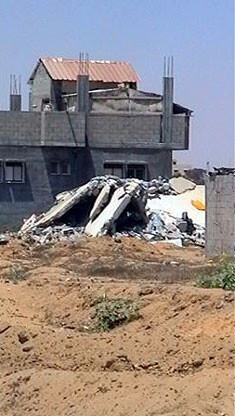
Above: Mohammed Abd il-Aal’s former two floor home, demolished, leaving 10 people homeless. (ISM Rafah)
A garden full of mango, guava, lemon trees and flowers, was demolished, along with a water tank belonging to the same family. The man who owned it has American citizenship, works in Gaza City, and stays near his work most of the time to avoid Abu Holi checkpoint.
It is no longer surprising to anyone here that American citizens get treated as Palestinians. It has been clear for ages that America does not take care of its own, much less those who come from such forgotten places as Rafah. As US passport holders, we have been advised by our embassy to leave the area. It is our own fault for being there if we are injured; our country has aligned itself nicely with Israel’s new policy of disclaiming any responsibility for human life in the Gaza Strip.
Beyond the buffer zone you can see Egypt, the green reminder of a better life elsewhere, only fifty meters away, fifty meters you are forbidden to walk under penalty of death. Fifty meters that used to hold Abu Ahmed’s farm before it was demolished nine months ago. A flourishing farming town, as Rafah once was, transformed tree by demolished tree into some dark futuristic world where Apaches rule the night.
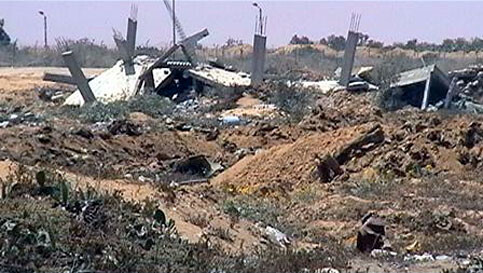
Above: Husein Abd il-Aal’s former one floor, 160 square meter home, demolished leaving 8 people homeless. (ISM Rafah)
Laura Gordon is a 20-year-old American Jew who came to Israel in December 2002 with the Birthright Israel program and proceeded, three months later, to begin work with the International Solidarity Movement in Rafah. She moved to Rafah two days after Rachel Corrie was killed and has been there since. She works primarily in media work and documentation; and also to liase between the Rafah community and the international community through summer camp projects, cooperative building projects, and English teaching.




